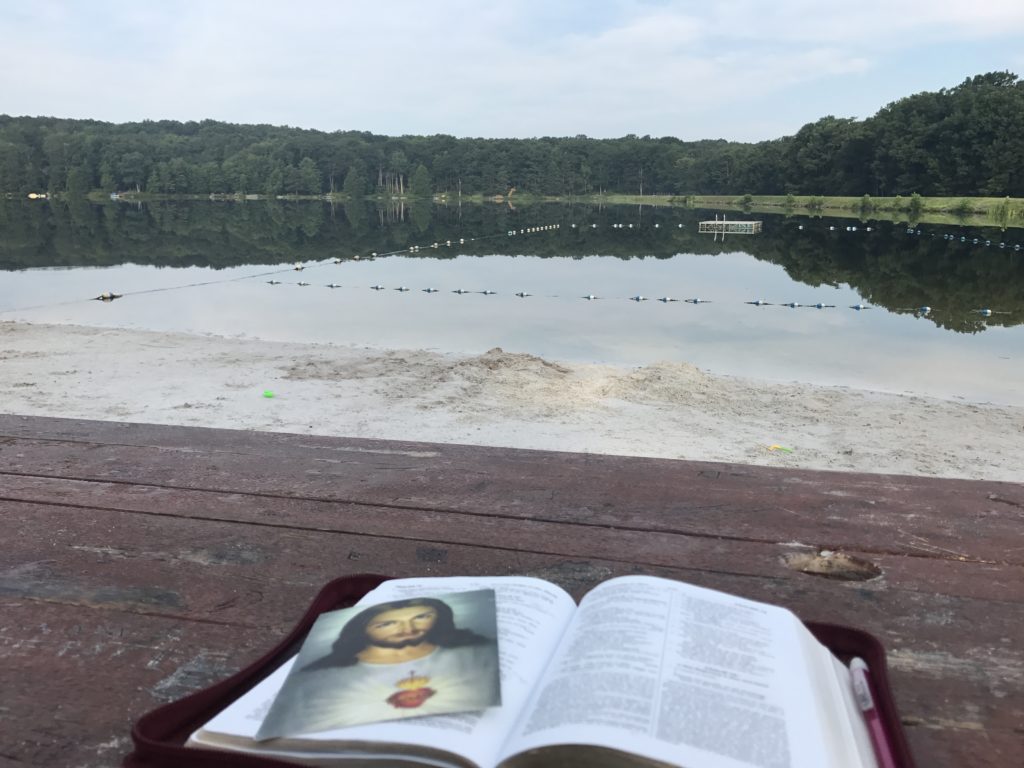Megan Wilson, Senior Anchor Intern – Evangelization
Most of my friends would not hesitate to describe me as an indecisive person. I’ve been known to spend weeks, months, or longer!, agonizing over a looming decision, flip-flopping between alternative plans of action, and filling up journal pages with lists of pros and cons or whiney complaints about the decision that lies before me. And usually even after some sort of decision is reached, my thoughts and prayer become flooded with a tangled knot of doubts and regrets.
After I began to notice this cyclical pattern within my decision making, I became more attentive to my prayer as I struggled to make decisions. My default in prayer had developed into a familiar scene in Adoration. Kneeling in silence in front of Jesus, I would pray for an open heart to listen to where the Lord was leading me: “Alright Jesus, I’m ready to listen to what You want me to do. So tell me what to do now please and thank you!” Unfortunately, I would usually leave the Adoration chapel more confused or discouraged after my desperate prayers. My “miraculous voice in Adoration” plan had fallen through more times than I’d care to admit. I felt that God wasn’t answering my prayers and that any sort of decision placed in my path had become a puzzle that He wouldn’t help me solve. If I wanted to carry out God’s will and do what He wanted me to do, why couldn’t He just make it a little easier for me to do so by showing me the right path?
My indecisiveness also stemmed from a place of deep mistrust of myself and my own decision-making faculties. Time and time again I was so afraid of making the wrong decision that I found myself paralyzed in fear, stuck in a state of limbo or of inaction among the options that I was considering. Instead of thinking of my free will as a gift, I viewed it as a burden or an obstacle in my relationship with God.
I realized that what I really wanted was for God to make all of my decisions for me and that in doing so I had put Him in a box. I wanted definitive answers, to know where I was going, and I wanted to hear God say it. I wanted to experience and hear God in my terms and in my way. I was not being open to how He wanted to speak to me or reveal Himself to me.
In 1 Kings 19, we read the story of the prophet Elijah, who ascends a mountain in order to find the Lord. He experiences the passing of a strong wind, an earthquake, and blazing fire. Elijah is seeking the Lord, but the Lord is not in the wind, earthquake, or fire. It is only afterward when the Lord reveals Himself to Elijah through “a light silent sound.” God reveals Himself not through thunderous natural phenomena, but instead in a quiet whisper.

However tempting it might be, God doesn’t want us to test Him or beg for a miraculous sign or response when we are making decisions. God doesn’t always work like that. A lot of times, He is in the small whisper calling us to trust Him in faith even when we don’t know where the path ahead of us may lead. In fact, the Lord may work through the journey of increased faith and trust in choosing to walk alongside Him amidst uncertainty and fear. God calls us to greater trust in Him and His plan through the actual process of decision making and in wrestling with our options and all the while seeking Him.
In the paralyzing unknown that accompanies difficult decision making, worrying is a natural response which in reality leads us nowhere. Our Lord, who is ever-faithful and unchanging, promises us true peace when we put our faith in Him. Instead of worrying, He calls us to cast all of our worries upon Him (1 Peter 5:7). When the decision in front of us is challenging or when God doesn’t seem to give us an easy answer, we can allow the experience to be an opportunity to deepen our faith instead of doubting His goodness or His plan for us. And especially when discerning between two goods, we can remain faithful that God will be with us no matter what we decide. We can choose to see the decision as a blessing instead of a burden, and in all circumstances give thanks for how the Lord works in our lives (1 Thessalonians 5:18). God will never fail us, even amidst anxiety, doubt, fear, or worry that may accompany decision making. As our faith is challenged in periods of uncertainty, we are called to grow in trust of God’s accompaniment and to grow in receptivity of how He is calling out to us, even if it’s not how we’d expect.
Megan, I related very much to this reflection. Thank you for sharing some honest and encouraging words. We’re lucky to have you an a anchor intern.